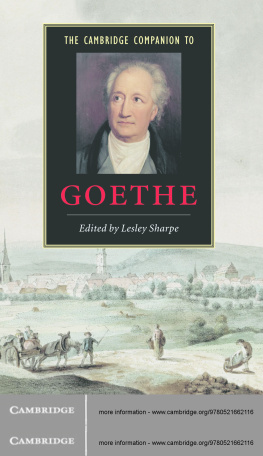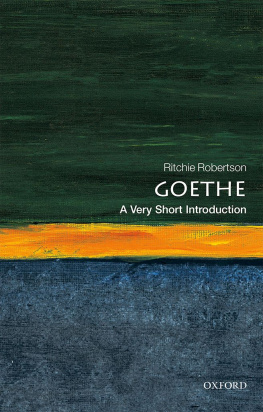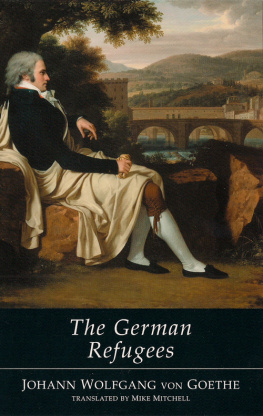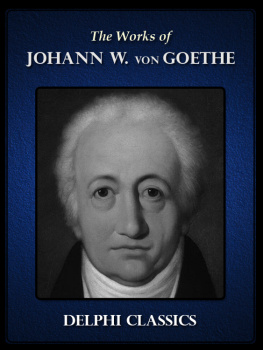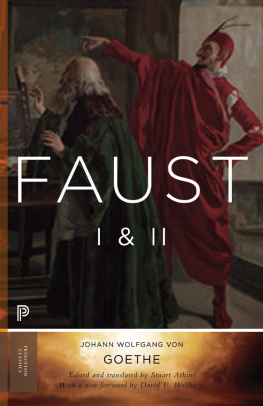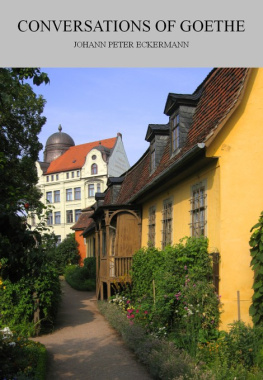Johann Wolfgang Goethe - Faust, Part One
Here you can read online Johann Wolfgang Goethe - Faust, Part One full text of the book (entire story) in english for free. Download pdf and epub, get meaning, cover and reviews about this ebook. year: 2008, publisher: Oxford Worlds Classics, genre: Detective and thriller. Description of the work, (preface) as well as reviews are available. Best literature library LitArk.com created for fans of good reading and offers a wide selection of genres:
Romance novel
Science fiction
Adventure
Detective
Science
History
Home and family
Prose
Art
Politics
Computer
Non-fiction
Religion
Business
Children
Humor
Choose a favorite category and find really read worthwhile books. Enjoy immersion in the world of imagination, feel the emotions of the characters or learn something new for yourself, make an fascinating discovery.

- Book:Faust, Part One
- Author:
- Publisher:Oxford Worlds Classics
- Genre:
- Year:2008
- Rating:5 / 5
- Favourites:Add to favourites
- Your mark:
- 100
- 1
- 2
- 3
- 4
- 5
Faust, Part One: summary, description and annotation
We offer to read an annotation, description, summary or preface (depends on what the author of the book "Faust, Part One" wrote himself). If you haven't found the necessary information about the book — write in the comments, we will try to find it.
Faust, Part One — read online for free the complete book (whole text) full work
Below is the text of the book, divided by pages. System saving the place of the last page read, allows you to conveniently read the book "Faust, Part One" online for free, without having to search again every time where you left off. Put a bookmark, and you can go to the page where you finished reading at any time.
Font size:
Interval:
Bookmark:
 Great Clarendon Street, Oxford OX2 6DP Oxford University Press is a department of the University of Oxford.
Great Clarendon Street, Oxford OX2 6DP Oxford University Press is a department of the University of Oxford.
It furthers the Universitys objective of excellence in research, scholarship,
and education by publishing worldwide
in Oxford New York Athens Auckland Bangkok Bogot Buenos Aires Calcutta
Cape Town Chennai Dar es Salaam Delhi Florence Hong Kong Istanbul
Karachi Kuala Lumpur Madrid Melbourne Mexico City Mumbai
Nairobi Paris So Paulo Singapore Taipei Tokyo Toronto Warsaw with associated companies in Berlin Ibadan Oxford is a registered trade mark of Oxford University Press
in the UK and in certain other countries Published in the United States
by Oxford University Press Inc., New York Translation and editorial material David Luke 1987 The moral rights of the author have been asserted Database right Oxford University Press (maker) First published 1987 by Oxford University Press as a
Worlds Classics paperback and simultaneously in a hardback edition
Reissued as an Oxford Worlds Classics paperback 1998 All rights reserved. No part of this publication may be reproduced, stored in a retrieval system, or transmitted, in any form or by any means, without the prior permission in writing of Oxford University Press, or as expressly permitted by law, or under terms agreed with the appropriate reprographics rights organizations. Enquiries concerning reproduction outside the scope of the above should be sent to the Rights Department, Oxford University Press, at the address above You must not circulate this book in any other binding or cover
and you must impose this same condition on any acquirer British Library Cataloguing in Publication Data Data available Library of Congress Cataloging in Publication Data Goethe, Johann Wolfgang von, 17491832.
Faust, part one.
(Oxford worlds classics)
Translation of: Faust, 1. Theil.
I. Luke, David, 1921 . Title. III. III.
Title:
Faust, part 1. IV. Series.
PT2026.F2L85 1987 832.6 871559
ISBN13: 9780192835956
ISBN10: 0192835955 Printed in Great Britain by
Clays Ltd, St Ives plc OXFORD WORLDS CLASSICSFor over 100 years Oxford Worlds Classics have brought readers closer to the worlds great literature. Now with over 700 titlesfrom the 4,000-year-old myths of Mesopotamia to the twentieth centurys greatest novelsthe series makes available lesser-known as well as celebrated writing. The pocket-sized hardbacks of the early years contained introductions by Virginia Woolf, T. S.
Eliot, Graham Greene, and other literary figures which enriched the experience of reading. Today the series is recognized for its fine scholarship and reliability in texts that span world literature, drama and poetry, religion, philosophy and politics. Each edition includes perceptive commentary and essential background information to meet the changing needs of readers. Refer to the to navigate through the material in this Oxford Worlds Classics ebook. Use the asterisks (*) throughout the text to access the hyperlinked Explanatory Notes.OXFORD WORLDS CLASSICS JOHANN WOLFGANG VON GOETHE
JOHANN WOLFGANG VON GOETHE
 Translated with an Introduction and Notes by
Translated with an Introduction and Notes byDAVID LUKE
 OXFORD WORLDS CLASSICS
OXFORD WORLDS CLASSICSPART ONE
In the early 1770s he was the dominating figure of the German literary revival, his tragic novel Werther bringing him international fame. In 1775 he settled permanently in the small duchy of Weimar where he became a minister of state and director of the court theatre; in 1782 he was ennobled as von Goethe. His journey to Italy in 17868 influenced the development of his mature classical style; in the 1790s, he and his younger contemporary Schiller (17591805) were the joint architects of Weimar Classicism, the central phase of German literary culture. Goethe wrote in all the literary genres but his interests extended far beyond literature and included a number of scientific subjects. Faust, written at various stages of his life and in a variety of styles, became a constantly enlarged repository of his personal wisdom. His creative energies never ceased to take new forms and he was still writing original poetry at the age of more than 80.
In 1806 he married Christiane Vulpius (17651816), having lived with her for eighteen years; they had one surviving son, August (17891830). Goethe died in 1832. DAVID LUKE was an Emeritus Student (Emeritus Fellow) of Christ Church, Oxford. He published articles and essays on German literature, and various prose and verse translations, including Goethes Selected Verse, Stifters Limestone and Other Stories, Kleists The Marquise of O and Other Stories, Selected Tales by the brothers Grimm, Goethes Iphigenia in Tauris and Hermann and Dorothea, and Thomas Manns Death in Venice and Other Stories. His translation of Faust Part One was awarded the European Poetry Translation Prize in 1989.
I have used the edition by L. J. Scheithauer (Reclams Universal-Bibliothek, Stuttgart, revised 1986) which is itself based on the monumental Weimarer Ausgabe, the historical-critical edition of Goethes writings by E. Schmidt and other authorities (Weimar 18871919; Faust / in vol. 14). 3, 1949) and that by Ernst Beutler in vol. 5 (1953) of the Zrich Gedenkausgabe. 5 (1953) of the Zrich Gedenkausgabe.
Goethes text has been transmitted by these and other standard modern editions virtually without variation or dispute. The prehistory or Entstehungsgeschichte, however, of this 1808 version of his Faust drama (that is, the process of its development from earlier fragmentary conceptions) is a more significant and complex matter, necessarily affecting any interpretation of the work and especially of this first part, which Goethe composed at intervals over a period of more than thirty years. This fundamental genetic problem is discussed in the Introduction, which is followed by a diagrammatic synopsis (pp. lvi f.). Additionally I have entered the abbreviations used in this synopsis (UR, FRA, and F.I) alongside the text itself; these inform the reader to which of the widely separated phases of composition any particular passage, or its unrevised equivalent, originally belonged. 14976, to which the asterisks in the text refer. 14976, to which the asterisks in the text refer.
The line-numbering of the English text corresponds to that of the German throughout. For convenience of reference I have also numbered the scenes (128), though this is not done by Goethe. Special thanks are due to the Rockefeller Foundation for generously enabling me to spend a month in 1985 at its study-centre in Bellagio during work on this edition. D.L.
Next pageFont size:
Interval:
Bookmark:
Similar books «Faust, Part One»
Look at similar books to Faust, Part One. We have selected literature similar in name and meaning in the hope of providing readers with more options to find new, interesting, not yet read works.
Discussion, reviews of the book Faust, Part One and just readers' own opinions. Leave your comments, write what you think about the work, its meaning or the main characters. Specify what exactly you liked and what you didn't like, and why you think so.


